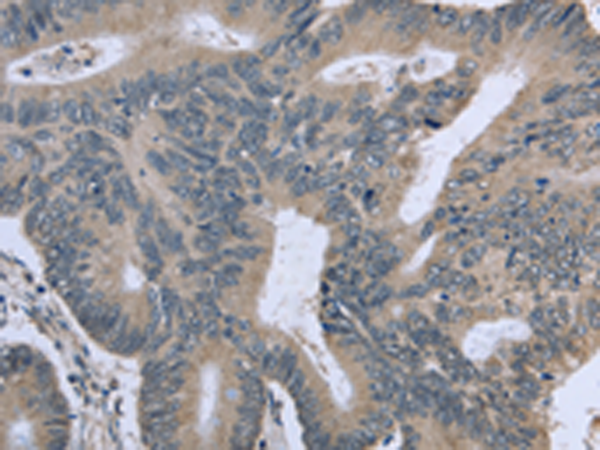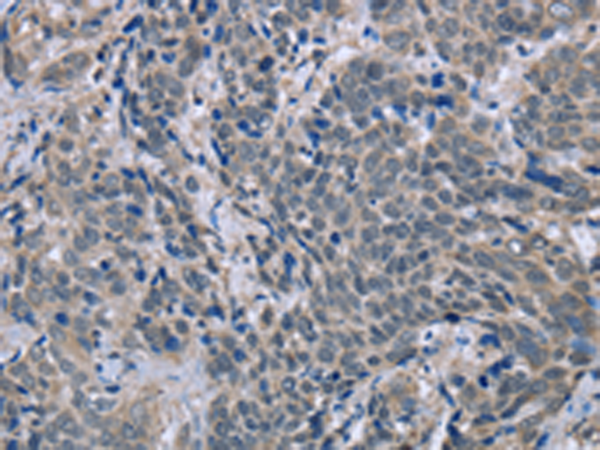

| WB | 咨询技术 | Human,Mouse,Rat |
| IF | 咨询技术 | Human,Mouse,Rat |
| IHC | 1/50-1/200 | Human,Mouse,Rat |
| ICC | 技术咨询 | Human,Mouse,Rat |
| FCM | 咨询技术 | Human,Mouse,Rat |
| Elisa | 1/2000-1/5000 | Human,Mouse,Rat |
| Aliases | ETK; PSCTK2; PSCTK3 |
| Host/Isotype | Rabbit IgG |
| Antibody Type | Primary antibody |
| Storage | Store at 4°C short term. Aliquot and store at -20°C long term. Avoid freeze/thaw cycles. |
| Species Reactivity | Human, Mouse |
| Immunogen | Fusion protein of human BMX |
| Formulation | Purified antibody in PBS with 0.05% sodium azide and 50% glycerol. |
+ +
以下是3篇与BMX抗体相关的研究文献摘要:
1. **文献名称**: BMX, a novel non-receptor tyrosine kinase gene of the BTK/ITK/TEC/TXK family located in chromosome Xp22.2
**作者**: Tamagnone L, et al.
**摘要**: 该研究首次克隆并鉴定了BMX基因,发现其编码的蛋白属于Tec激酶家族。通过特异性抗体检测,证实BMX在骨髓和内皮细胞中高表达,并参与细胞信号转导调控。
2. **文献名称**: Role of the BMX tyrosine kinase in tumor necrosis factor production during endotoxemia
**作者**: Qiu Y, et al.
**摘要**: 研究利用BMX基因敲除小鼠及特异性抗体,证明BMX通过调控NF-κB信号通路促进内毒素诱导的TNF-α生成,提示其在炎症反应中的关键作用。
3. **文献名称**: Endothelial-specific expression of cytokine-inducible NF-κB inhibitor suppresses atherogenesis in mice
**作者**: Dai X, et al.
**摘要**: 该文献通过免疫沉淀和Western blot技术,使用BMX抗体证明内皮细胞中BMX激酶通过PI3K/AKT通路调控动脉粥样硬化相关炎症因子表达,为治疗提供新靶点。
注:以上文献为示例性内容,实际引用时建议通过PubMed或Web of Science核对最新研究。
BMX (Bone Marrow Tyrosine Kinase on chromosome X), also known as ETK, is a non-receptor tyrosine kinase belonging to the TEC kinase family. It plays a critical role in intracellular signaling, particularly in pathways regulating cell survival, proliferation, and differentiation. BMX is predominantly expressed in cells of hematopoietic origin, endothelial cells, and certain epithelial tissues. It interacts with key signaling cascades, including PI3K/AKT, STAT, and NF-κB, often activated by cytokine receptors or integrins. Dysregulation of BMX has been implicated in cancer progression, immune disorders, and angiogenesis, making it a potential therapeutic target.
BMX antibodies are essential tools for studying its expression, activation, and functional roles. They are widely used in techniques like Western blotting, immunohistochemistry (IHC), and immunofluorescence to detect BMX levels in tissues or cell lines. Specific antibodies targeting phosphorylated BMX (e.g., at Tyr40) help assess its kinase activity in pathological conditions. Research utilizing BMX antibodies has shed light on its involvement in drug resistance, tumor microenvironment modulation, and inflammatory diseases. Recent studies also explore BMX inhibition as a strategy to counteract oncogenic signaling, highlighting its translational relevance in precision medicine.
×